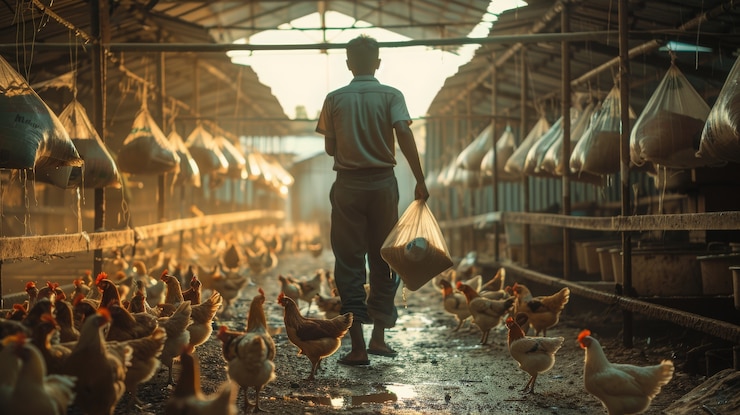In 2025, the Poultry Business remains one of the most lucrative agribusinesses in Ghana and most of West Africa. Demand from homes, schools, hotels, and restaurants for everything from fresh eggs to chicken meat is still high. This guide shows you exactly how to start and run a profitable poultry business in Ghana, whether you’re a business-minded individual looking for a low-entry investment, a rural trader looking to diversify your income, or a recent graduate looking for a source of income.
1: Decide the Type of Poultry Business
Before anything else, decide which branch of poultry farming you want to focus on:
➤ Egg Production (Layers)
-
Suitable for long-term profit
-
Steady daily income from egg sales
-
Initial setup is slightly more expensive
➤ Meat Production (Broilers)
-
Fast turnaround (6–8 weeks)
-
Good for festive seasons (Christmas, Easter)
-
Requires more frequent re-investment
➤ Day-Old Chicks (DOCs) or Hatchery
-
Capital intensive, ideal for large investors
-
Supplies other poultry farmers
Tip: For beginners, broiler production is easier and has quicker returns.
2: Calculate the Startup Capital
A small-scale poultry business can be started with as little as ₵2,000–₵5,000 depending on your scale. Here’s a basic breakdown:
| Item | Estimated Cost (₵) |
|---|---|
| 50 Day-old chicks | 500 |
| Poultry feed (first 6 weeks) | 800 |
| Vaccines and medication | 200 |
| Wooden or wire cage | 1,000 |
| Water, feeders & drinkers | 300 |
| Miscellaneous | 200 |
| Total | ₵3,000 |
Tip: Start small, test your process, then scale gradually.
3: Build or Secure a Poultry House
Poultry birds require a clean, well-ventilated and predator-free space. Your poultry house must:
-
Be raised above ground level
-
Have adequate space (1–2 birds per sq. foot)
-
Include light, air flow, and access to water/feed
For backyard farmers, even a basic wooden coop or block house can serve as a starter facility. Ensure biosecurity (protection from disease spread) is top priority.
4: Choose Quality Chicks and Feed
Your success depends on quality inputs. Buy from certified hatcheries or agro-vet stores.
-
Buy vaccinated chicks
-
Feed with high-protein starter feed (first 4 weeks)
-
Switch to grower feed afterward
-
Always provide clean water
Feeding accounts for 70% of poultry costs, so do not compromise here.

5: Follow a Vaccination Schedule
To avoid sudden losses, follow proper vaccination. Common poultry diseases in Ghana include:
-
Newcastle disease
-
Gumboro
-
Fowl pox
-
Marek’s disease
Consult your local veterinary officer or extension agent to help you create a vaccination chart. Preventing disease is cheaper than treatment.
6: Register Your Business (Optional but Strategic)
If you plan to scale, access loans, or supply institutions, register your poultry business with the Registrar General’s Department in Ghana. The process costs as little as ₵60–₵150 depending on the structure.
Benefits:
-
Business recognition
-
Access to grants and funding
-
Ability to open a business bank account

7: Market Your Poultry Products
Don’t wait till harvest to find customers. Use these local methods:
➤ Sell to:
-
Chop bars, restaurants, and local markets
-
Schools and food vendors
-
Cold stores and supermarkets
➤ Use WhatsApp & Facebook Marketplace:
-
Take clean photos of birds/eggs
-
Share your prices and delivery locations
-
Offer discounts for bulk purchases
Word-of-mouth and social media are your best marketing tools when starting small.
Bonus Tip: Add Value for More Profit
Don’t just sell live birds. Add extra profit by:
-
Processing and packaging chicken meat
-
Boiling and selling eggs in traffic or roadside stands
-
Making chicken droppings into organic fertilizer
Value addition is key to standing out in Ghana’s poultry market.
Challenges to Expect (And How to Overcome Them)
| Challenge | Solution |
|---|---|
| Disease outbreaks | Strict hygiene, regular vet checkups |
| High feed cost | Mix local feeds (e.g., maize, soybeans) |
| Market price fluctuations | Build loyal buyers, sell directly to consumers |
| Theft | Use lockable cages and security |
Why 2025 Is the Best Time to Start
Poultry farming continues to be one of Ghana’s most promising small business ventures due to rising food costs and rising demand for protein. Act now, regardless of whether you begin with 20 birds in your backyard or 200 in a suitable pen.






Be First to Comment